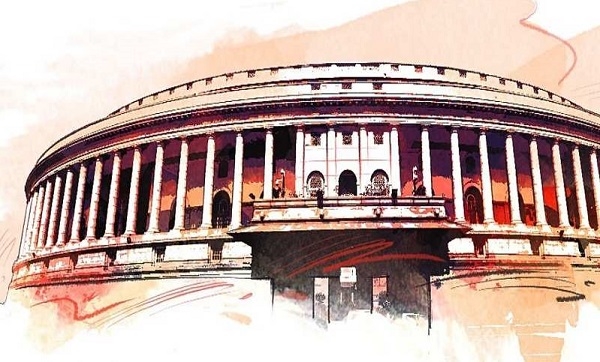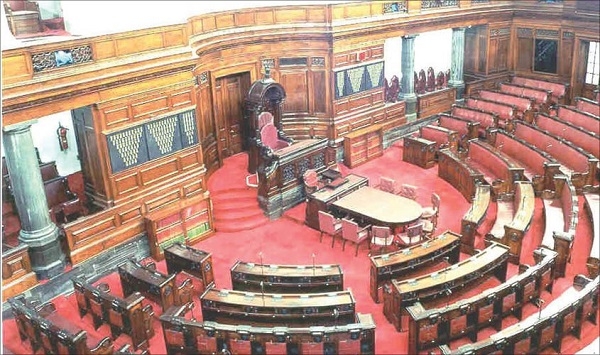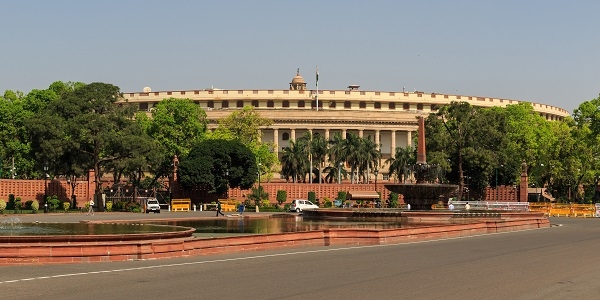What is the Relevance of the Rajya Sabha?
Total Views |
A cartoon making the rounds in the social media showed a father watching WWE (World Wrestling Entertainment) channel and his young son querying him, “Dad, why watch WWE when Rajya Sabha is in session? It has more action, sloganeering, chaos, pandemonium and disorder. What excitement with the Chairman looking more helpless than our class teacher!” Another cartoon showed a young boy telling his father, “Why engineer or doctor? I want to be a Rajya Sabha member. It is the most lucrative job in the world – enormous power, salaries and privileges with life time pension – only for shouting slogans for a few days in a year”.
One wonders as to how the members of Rajya Sabha viewed the said cartoons. But one thing is certain; the cartoons do reflect the feelings of the citizens of the country. It is simply disgusting to see members storming the well of the house, displaying placards, shouting slogans and even resorting to howling to prevent the house from transacting any business. Worse and quite unabashedly, they appear to be enjoying themselves; joking and goading each other to shout louder. A new issue is concocted every day to disrupt the house. Smug smiles appear on their faces on forcing adjournment of the house.
Independent India opted for a bicameral legislature as a single directly elected chamber (Lok Sabha) was considered inadequate to meet the challenges of India’s federal system with immense diversities. The second chamber (Rajya Sabha) was meant to be the federal chamber, to be elected by the elected members of the state assemblies and the union territories.

It will be in order here to examine the powers that the Indian constitution grants to Rajya Sabha. In case of an ordinary legislation, joint sitting of both Houses can be called to resolve a deadlock between the two Houses. There is no provision for resolving a deadlock between the two Houses in regard to a constitution amendment bill. Such a Bill has to be passed by the specific majority, as prescribed under article 368 of the constitution, by both Houses. However, as regards the Money Bills, Lok Sabha enjoys pre-eminence over Rajya Sabha.
In all bicameral systems, the upper chamber acts as the conscience-keeper of the constitution and imposes caution on the ruling party which may be tempted to take hasty decisions through its sheer majority in the lower house. In other words, the upper house ensures that all legislative decisions are taken after due diligence and in conformity with the underlying spirit of the constitution. Wherever required, it provides rational counsel to the lower house. It is certainly not expected to act as a stumbling block in the governance of the country.
India spends hundreds of crores annually to sustain Rajya Sabha and on the on the pay/allowances/upkeep of its members. What does the country get in return: spectacle of shouting and shrieking members disrupting proceedings, with total disregard to national interests? The Chairman (who is also the Vice-President of the country) is disobeyed blatantly. His repeated pleas for order are impertinently ignored. It pains to see tax-payers’ money being spent on such a non-performing institution.
Abrogation of Peoples’ Right
An issue that is of far more criticality than the above mentioned wasteful expenditure pertains to our right as the people. India is a democracy and in this form of government the supreme power is vested in the people and exercised directly by them or by their elected representatives under a free electoral system. In other words, the constitution has mandated the ultimate power to us, the people of India.

In a democracy, the relationship between the electorate and the elected leaders is of reciprocal trust. It is based on solemn commitments. Leaders seek support on the basis of certain promises; people trust them and vote them to power. As elected leaders are expected to deliver on the promises made, people demand accountability at the end of their tenure in power. Non-performers are rejected at the next hustings.
We, the citizens of India, decided to repose our faith in the promises made by Modi at the time of the last general election. He promised to improve the lot of the common man through radical reforms to spur economic and industrial growth. His past track record as an honest, dedicated, innovative, dynamic and visionary leader helped him to establish his credentials. His missionary zeal to make India a strong and prosperous country through all-inclusive policies fascinated all. We were convinced of his sincerity of purpose and elected him to power.
We, the people of India, have been impressed by the untiring efforts being made by Modi for the betterment of the country in all spheres. However, most dishearteningly, we are also witnessing the sordid drama being played out by the opposition to impede all progressive steps being taken by Modi. It is apparent that the opposition leaders are desperately trying to prevent Modi from succeeding in fulfilling the promises he made to us. Yes, they want Modi to fail, even if it amounts to damaging our national interests. They dread Modi’s success. Survival instinct is an inalienable trait of every politician’s psyche. For survival, he can damn his country as well.
Modi wants to usher in reforms to fulfil his solemn commitments but the opposition leaders in Rajya Sabha thwart him by stalling the proceedings through continuous disruptions on superfluous issues. GST was indisputably a highly progressive and overdue measure. Two sessions of Rajya Sabha were wasted without passing this constitutional amendment. We, the concerned citizens of the country, find Rajya Sabha’s role to be totally unjustified.
How are the members of Rajya Sabha entitled to come between the electors (people) and the elected (ruling party)? What is their locus standi to usurp peoples’ right and decide whether the promises made to the people are to be fulfilled or not? Members of Rajya Sabha do not represent the people, the ultimate repository of power in a democracy. We have not elected them. They owe their seats in Rajya Sabha to their party leaders, and not to the popular support.
Finally
A question that is agitating the mind of all those concerned with the well-being of the country is about the need to have Rajya Sabha. Why have an institution that costs the nation dearly but is proving detrimental to the nation’s development and progress? Rajya Sabha is doing more harm than good. Most citizens feel that it has outlived its utility and should be abolished. Unfortunately, howsoever desirable such a step may be, it is going to remain a pipe dream. Rajya Sabha will never approve such a constitutional amendment and hence India is fated to carry the load of this unnecessary institution.

Nevertheless, as has been done to the upper chambers in most of the countries, powers of Rajya Sabha should also be curtailed. A time frame should be laid down for it to consider all bills. Should it fail to adhere to it, the bill should be deemed to have its approval.
In addition, the rules of business must be amended. Any member entering the well of the house or shouting slogans or displaying placards should attract automatic suspension for the rest of the session with due deduction in pay and pension. We, the people of India, are not paying taxes to reward members of Rajya Sabha for indulging in hooliganism.
When a political leader disrupts the house for irrelevant reasons, the whole country tends to lose faith in India’s political dispensation. People wonder if the framers of India’s constitution erred in opting for an upper house.
We elect leaders and give them tenure in office to fulfil the promises made to us. In turn, the elected leaders strive to prove themselves worthy of our trust by delivering. Unfortunately, Rajya Sabha stands between the electors and the elected like a wall. It impedes and stalls all progressive measures. Therefore, it is time the relevance, role and powers of Rajya Sabha are examined afresh. It cannot be allowed to hold the country to ransom for narrow political interests.

